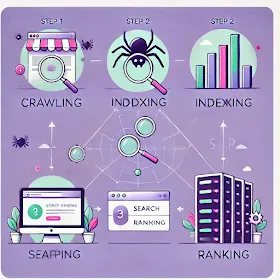Search Engine Optimization (SEO) is the practice of optimizing a website to improve its visibility and ranking on search engine results pages (SERPs). In simple terms, SEO helps your website get found by the right audience at the right time. Whether you’re a beginner or a seasoned business owner, understanding SEO is crucial for driving organic traffic and achieving your online goals.
How SEO Works
At its core, SEO works by aligning your website content with what users are searching for online. Search engines like Google use algorithms to analyze and rank web pages based on relevance and quality. Here’s a breakdown of the key factors that influence SEO:
Keywords: These are the words or phrases people type into search engines. Identifying and using relevant keywords in your content helps search engines understand your website’s focus.
Content Quality: High-quality, valuable content attracts users and encourages them to stay longer on your site.
Backlinks: Links from other reputable websites signal to search engines that your site is trustworthy and authoritative.
Technical SEO: This includes site speed, mobile-friendliness, and structured data that make your site easy for search engines to crawl and index.
Why is SEO Important?
Investing in SEO is one of the most effective ways to grow your online presence. Here’s why:
Increased Visibility: SEO helps your website rank higher in search results, making it easier for potential customers to find you.
Cost-Effective Marketing: Unlike paid advertising, SEO focuses on organic traffic, offering long-term benefits without continuous investment.
Builds Credibility: A well-optimized website with valuable content establishes trust and authority in your industry.
Better User Experience: Optimized websites load faster, are mobile-friendly, and provide a seamless experience for visitors.
Key Components of SEO
1. On-Page SEO
On-page SEO focuses on optimizing individual web pages to rank higher and earn more relevant traffic. Key elements include:
Title Tags: Craft compelling and keyword-rich titles for each page.
Meta Descriptions: Write concise summaries that entice users to click.
Content Optimization: Use headings, keywords, and multimedia effectively.
Internal Linking: Connect related pages within your site to improve navigation.
2. Off-Page SEO
Off-page SEO refers to activities outside your website that influence its ranking. Common strategies include:
Backlinks: Earning links from high-quality websites boosts your site’s authority.
Social Media: Sharing your content on social platforms increases visibility.
Brand Mentions: Positive mentions of your brand online contribute to your credibility.
3. Technical SEO
Technical SEO ensures that your website is easy for search engines to crawl and index. Focus on:
Site Speed: Fast-loading pages improve user experience and rankings.
Mobile Optimization: Ensure your site works seamlessly on all devices.
Structured Data: Use schema markup to help search engines understand your content better.
SEO vs. SEM: What’s the Difference?
While SEO (Search Engine Optimization) focuses on improving organic rankings, SEM (Search Engine Marketing) includes paid strategies like pay-per-click (PPC) advertising. Here’s a quick comparison:
| Aspect | SEO | SEM |
|---|---|---|
| Cost | Free (organic) | Paid |
| Timeframe | Long-term | Immediate |
| Traffic Type | Organic | Paid |
| Goal | Sustainable growth | Quick visibility |
For best results, many businesses use a combination of SEO and SEM to maximize their online reach.
Final Thoughts
SEO is a powerful tool that can help businesses and individuals achieve their online goals. By understanding how SEO works, why it’s important, and mastering its key components, you can create a solid foundation for online success. Start by optimizing your on-page content, building quality backlinks, and ensuring your website’s technical performance is up to par.
Whether you’re an SEO beginner or a business owner looking to enhance your online presence, investing time and effort into SEO will pay dividends in the long run.



0 Comments